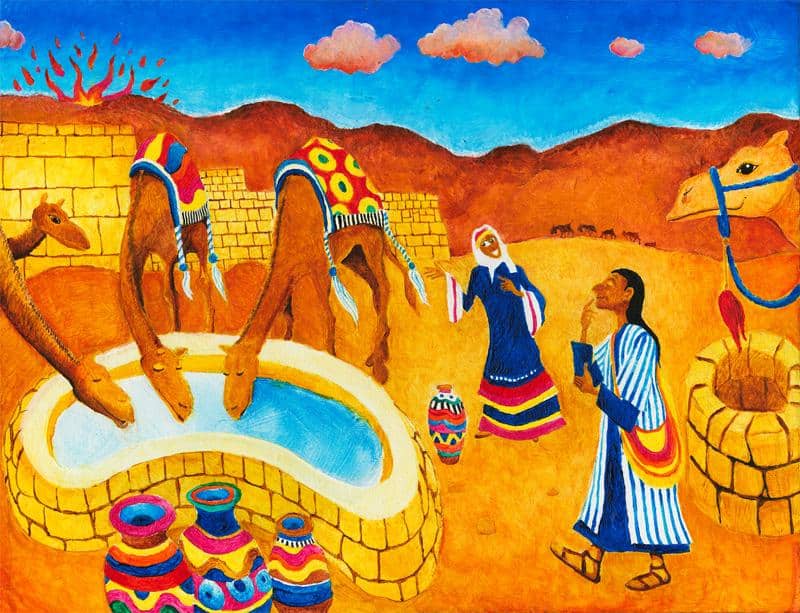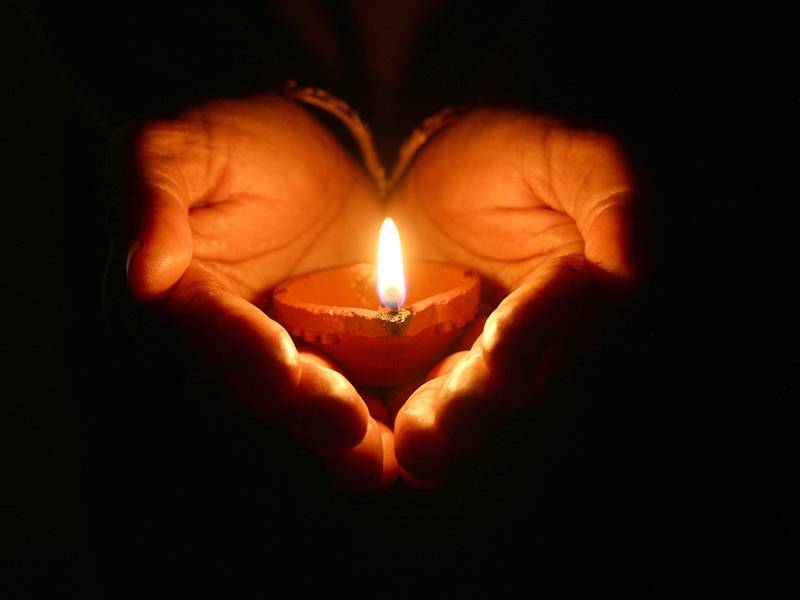Bonjour / Hello [nickname_else_first_name]
Table of contents
1) Perashat Hashavoua - Rabbi Eli Mansour
2) Halakhat Hashavoua (Halakhot related to day to day life) By Hazzan David Azerad
Buying Food for Shabbat - Peninei Halacha
3) Holy Jokes!
4) For KIDS

This Week's Parasha Insight with Rabbi Eli Mansour
Parashat Haye Sarah- Contemplating the Final Redemption
Parashat Hayeh-Sara tells the famous story of the selection of Ribka as a wife for Yishak. One of the more perplexing aspects of this story is the account of Ribka and Yishak’s first encounter. We read that Yishak went "Lasu’ah Ba’sadeh" – literally, "to converse in the field" – late in the afternoon, before dark, when he looked up and saw camels making their way towards him (24:63). When Ribka saw Yishak, the Torah relates, she "fell off the camel" (24:64). Rashi explains that Yishak went to the field to pray, and when Ribka saw him, his uniquely distinguished appearance made a deep impression on her, and she lowered herself from the camel toward the ground.
Other commentators, however, offer different explanations of this story.
The work Birkat Abraham explains based on the Sages’ comment that the word "Sadeh" ("field") in this verse alludes to the Bet Ha’mikdash. When the Torah speaks of Yishak going to "converse" in the "Sadeh," the Birkat Abraham writes, it means that he went to contemplate the rebuilding of the third and final Bet Ha’mikdash. He contemplated what would happen "Lifnot Areb" – "before dark," in the final generation of exile, at the very end of Jewish history. He thought about and reflected upon the question of how his descendants, the Jewish Nation, would be worthy of redemption and the rebuilding of the Mikdash. After so many centuries in exile, living among gentile nations and suffering persecution, they would be on a very low spiritual level. How, then, would the "Sadeh" – the empty "field," the ruins of the Bet Ha’mikdash – be rebuilt?
Yishak found his answer in the "Gemalim" – the camels. The word "Gamal" ("camel") has the same letters as the name of the letter "Gimal." The Gemara in Masechet Shabbat explains the significance of all the different letters of the Hebrew alphabet, and it teaches that the letter "Gimal" represents "Gemilut Hasadim" – performing kindness. The "Gimal" is positioned in the alphabet right before the letter "Dalet," which represents "Dal" – the pauper. The "Gimal" has a "leg" that is extended toward the next letter, symbolizing charitable giving to the poor. Hence, when the Torah says that Yishak raised his eyes and saw "Gemalim," it means that he saw the "Gimal" – loving-kindness and selfless giving. This was the answer to his vexing question about the end of the Jewish exile.
Citing the Hiddusheh Ha’Rim (Rav Yishak Meir Alter of Ger 1799-1866), the Birkat Abraham explains that the final redemption will arrive specifically in the merit of Gemilut Hasadim. Jewish life is built upon the three "pillars" of Torah study, Aboda (devoted service to Hashem, such as through prayer), and acts of kindness. These are embodied by the three patriarchs: Abraham was the pillar of kindness, Yishak was the pillar of Aboda, and Yaakob was the pillar of Torah study. With time, the Jewish Nation’s standards of study and service have declined. In our generation, though we are blessed with higher numbers of full-time students of Torah than ever before, we are incapable of producing Torah scholars of the caliber of previous generations’ sages, such as the Hafetz Haim and the Ben Ish Hai. We will never be able to produce scholars on the level of the Tanna’im and Amora’im. Likewise, we have fallen very far from the previous generations’ standards of prayer. Our synagogues are, Baruch Hashem, large, beautiful, and filled to capacity, but the quality of our prayers will never reach that of our ancestors in Aleppo, for example. However, with regard to the third pillar, we can proudly claim to have not only matched, but exceeded, the standards of our predecessors. Technology has enabled individuals and organizations to lend assistance to people in need on a scale of an entirely different magnitude than in the past. While in the past people were able to help only their close neighbors, today, people generously donate charity and run organizations that help literally thousands of people each and every day. And it is in this merit that our redemption will come. As the prophet Yeshayahu (1:27) proclaimed, "Zion shall be redeemed through justice; and those who return to it, through charity."
This is what Yishak saw. As he contemplated the end of times, and wondered how his descendants will be worthy of the rebuilding of the Bet Ha’mikdash given the process of spiritual decline, he saw the "Gemalim" – the outstanding acts of kindness that will be performed in our times.
When Ribka realized what was happening, the Birkat Abraham writes, she fell off her camel in excitement. She saw that the time will come when the Jewish Nation will excel in the area of Hesed far beyond any previous generation, and this is what will make them deserving of the end of exile and the rebuilding of the Bet Ha’mikdash, may it happen speedily and in our times, Amen.

Halachot this week are selected and Translated by Hazzan David Azerad
Buying Food for Shabbat - Peninei Halacha
It is a mitzvah to make Shabbat enjoyable through superior food and beverages, depending on one’s means. Spending generously and preparing many tasty foods is praiseworthy (MT 30:7) and a fulfillment of the verse: “Call Shabbat ‘delight’” (Yeshayahu 58:13). The Sages state that whoever fulfills the mitzvah of oneg Shabbat (making Shabbat a delight) merits great things: he receives a limitless portion; his heart’s desires are fulfilled; he is saved from the birth-pangs of the Messiah, from the pre-messianic wars, and from hell; and he becomes wealthy (Shabbat 118-119a). This is because life and blessing depend upon the connection between the material and spiritual realms. One is alive if his soul inhabits his body; when one dies, his soul departs his body. When one’s material existence is linked to higher realms, it is invigorated and blessed at its root; when it is distanced from the source of its vitality, from faith and spiritual values, its life is diminished, it deteriorates, and it is cursed. What makes Shabbat special is that it has increased sanctity expressed in both body and soul – through Torah, prayer, and festive meals. This unifies the spiritual and material, the body and the soul. Life is strengthened, and blessing flows to the world. Therefore the Sages state that whoever properly enjoys Shabbat merits many blessings and is saved from evil (see also below, 7:1).
One must spend as much as he can on Shabbat food, taking into account his weekday habits. In other words, he need not buy the most expensive foods in the market to honor Shabbat, but he must buy better food than what he and his family normally eat on a weekday. The specifics vary from family to family. It seems reasonable to suggest that one should spend twice as much on food for Shabbat as on food for a weekday. Those who go above and beyond spend even more, and they receive great reward for this.
One who is struggling financially and is unable to buy superior food for Shabbat should cut back on his food expenditures during the week, so that at the very least he will be able to buy something special, like small fish, in honor of Shabbat (Shabbat 118b). There are many people who waste money on luxuries, but when they have expenses connected with mitzvot they suddenly become thrifty and stingy. In fact, it is appropriate for one to cut back on luxuries and indulge in mitzvot. The Sages state that one’s annual earnings are allotted by God on Rosh Ha-shana (Beitza 16a), and that one must take care not to waste money on frivolous purchases, because he may exceed his allowance and be left penniless. This allotment, however, excludes money spent on Shabbat and Yom Tov and on his children’s Torah study. If he spends less on these, it is deducted from what was allotted to him; if he spends more on them, his allotment is increased (Taz 242:1).
One who does not have money available to buy food for Shabbat should borrow money in order to make Shabbat enjoyable. He should not worry that something will happen to prevent him from repaying the loan. God assures the Jewish people: “My children, borrow money and sanctify the day. Trust Me, for I will repay it” (Beitza 15b). This is on condition that one does not rely on a miracle, but rather has a business or a regular salary or savings upon which he can rely. The Sages have such a person in mind when they state that one should not worry that he might not succeed in repaying the debt; if he acts properly, works diligently, and is not a spendthrift, God will help him repay.
But one who does not know how he will repay his debt must not borrow money to make Shabbat enjoyable, because he may become a wicked person who does not repay his debts.[2] He also should not ask for charity. Rather, he should eat simple food on Shabbat, following R. Akiva’s recommendation: “Make your Shabbat like a weekday, and do not rely on others” (Pesaĥim 112a). As a reward for not becoming a burden to others, one will become rich (m. Pe’ah 8:9). However, a poor person who has already been forced to accept charity to meet his various needs should also accept charity in order to make Shabbat enjoyable (MB 242:1).
Bevirkat Shabbat Shalom Umevorach
David Azerad
3) HOLY JoKeS!!
Selection of funny snippets, loosely related to this weeks parashah or current events, to brighten your day


4) FOR KIDS

Click on the image above to open the youtube video
Chayei Sarah Arts & Crafts (click on image to go to site)
















